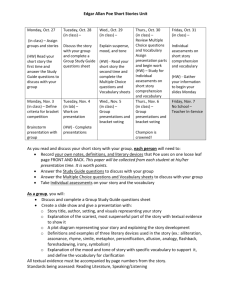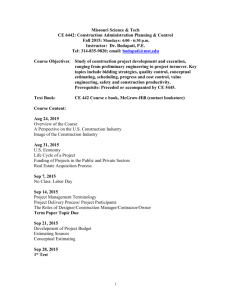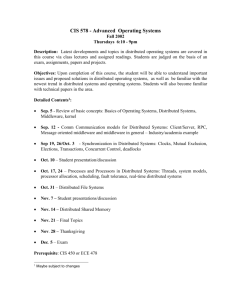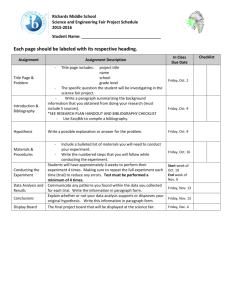Folklore and Popular Culture - Memorial University of Newfoundland
advertisement
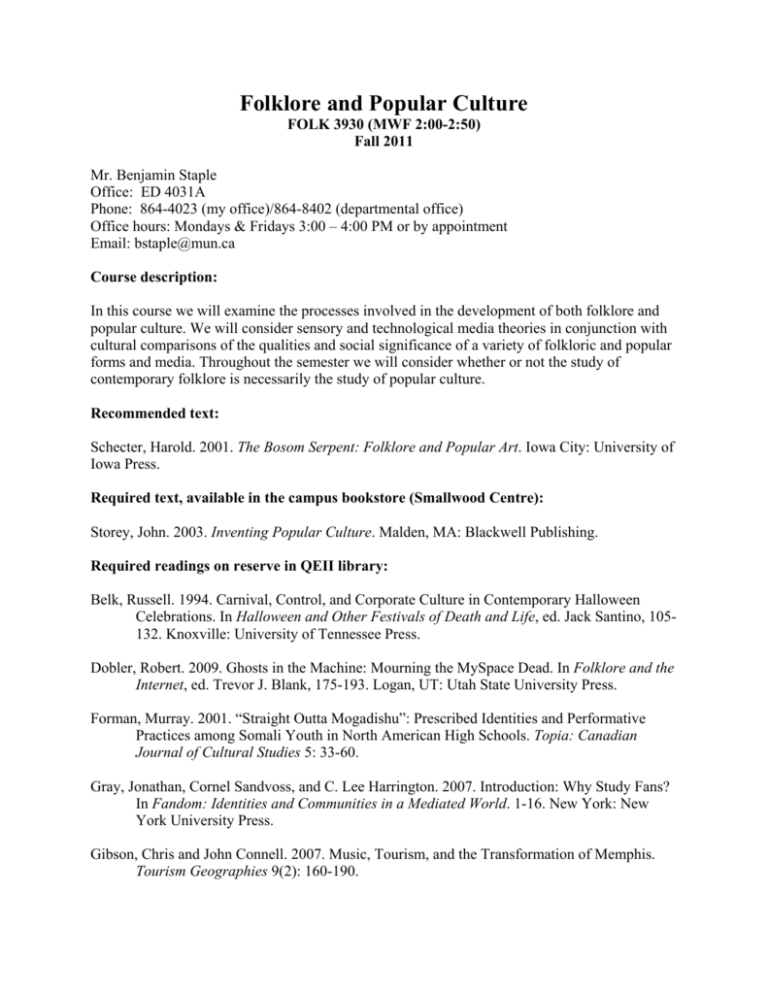
Folklore and Popular Culture FOLK 3930 (MWF 2:00-2:50) Fall 2011 Mr. Benjamin Staple Office: ED 4031A Phone: 864-4023 (my office)/864-8402 (departmental office) Office hours: Mondays & Fridays 3:00 – 4:00 PM or by appointment Email: bstaple@mun.ca Course description: In this course we will examine the processes involved in the development of both folklore and popular culture. We will consider sensory and technological media theories in conjunction with cultural comparisons of the qualities and social significance of a variety of folkloric and popular forms and media. Throughout the semester we will consider whether or not the study of contemporary folklore is necessarily the study of popular culture. Recommended text: Schecter, Harold. 2001. The Bosom Serpent: Folklore and Popular Art. Iowa City: University of Iowa Press. Required text, available in the campus bookstore (Smallwood Centre): Storey, John. 2003. Inventing Popular Culture. Malden, MA: Blackwell Publishing. Required readings on reserve in QEII library: Belk, Russell. 1994. Carnival, Control, and Corporate Culture in Contemporary Halloween Celebrations. In Halloween and Other Festivals of Death and Life, ed. Jack Santino, 105132. Knoxville: University of Tennessee Press. Dobler, Robert. 2009. Ghosts in the Machine: Mourning the MySpace Dead. In Folklore and the Internet, ed. Trevor J. Blank, 175-193. Logan, UT: Utah State University Press. Forman, Murray. 2001. “Straight Outta Mogadishu”: Prescribed Identities and Performative Practices among Somali Youth in North American High Schools. Topia: Canadian Journal of Cultural Studies 5: 33-60. Gray, Jonathan, Cornel Sandvoss, and C. Lee Harrington. 2007. Introduction: Why Study Fans? In Fandom: Identities and Communities in a Mediated World. 1-16. New York: New York University Press. Gibson, Chris and John Connell. 2007. Music, Tourism, and the Transformation of Memphis. Tourism Geographies 9(2): 160-190. Margry, Peter Jan. 2008. The Pilgrimage to Jim Morrison’s Grave at Père Lachaise Cemetery: The Social Construction of Sacred Space. In Shrines and Pilgrimage in the Modern World: New Itineraries into the Sacred, ed. Peter Jan Margry, 143-172. Amsterdam: Amsterdam University Press. Penfold, Steve. 2002. ‘Eddie Shack Was No Tim Horton’: Donuts and the Folklore of Mass Culture in Canada. In Food Nations: Selling Taste in Consumer Societies, eds. Warren Belasco and Philip Scranton, 48-66. New York: Routledge. Narváez, Peter. 2007. Fandom as Magical Practice: Great Big Sea, Stockwell Day and Spoiled Identity. Newfoundland and Labrador Studies 22: 335-344. Narváez, Peter and Martin Laba, eds. 1986. Media Sense: The Folklore-Popular Culture Continuum. Bowling Green, Ohio: Bowling Green State University Popular Press. Wojcik, Daniel. 2008. Pre’s Rock: Pilgrimage, Ritual, and Runners’ Traditions at the Roadside Shrine to Steve Prefontaine. In Shrines and Pilgrimage in the Modern World: New Itineraries into the Sacred, ed. Peter Jan Margry, 201-237. Amsterdam: Amsterdam University Press. Course Outline: Sept. 7-9 Introduction to course requirements and texts. The Folklore-Popular Culture Continuum: Narváez and Laba 9-18 Sept. 12-16 Popular Culture as Folk Culture Storey 1-15; “Why Study Fans?” (from Gray, Fandom, 1-19) Sept. 19-23 Popular Culture, Mass Culture, and High Culture Storey 16-62 Sept. 26-30 Popular Culture and Hegemony Storey 63-77 Oct. 3-7 Popular Culture and Postmodernism Storey 78-91; Forman, ‘Straight Outta Mogadishu’ Book review due (Friday the 7th [extension]) Oct. 10 Thanksgiving holiday. No lecture. Oct. 12-14 Identity and Performance in Popular Culture Margry, “The Pilgrimage to Jim Morrison's Grave”; Narváez, “Fandom as Magical Practice” Oct. 17-21 Art, Aesthetic, and Globalization Storey 92-120 Presentations (Friday) 2 Oct. 24-28 Oct. 31Nov. 4 Nov. 7-9 Penfold, “Eddie Shack was no Tim Horton” (read for Monday) Film: “The Celluloid Closet” (1996) (Wednesday & Friday) Folklore and Popular Film Schecter 1-80 (optional); Guest Lecture: Dr. Cory Thorne (Oct 31) Presentations (Friday) Spectacles and Shrines Belk, “Carnival, Control, and Corporate Culture”; Gibson and Connell, “Music, Tourism, and the Transformation of Memphis” Presentations (Wednesday) Nov. 11 Remembrance Day. No lecture. Nov. 14-18 Wojcik, “Pre’s Rock;” Dobler, “Ghosts in the Machine” (read for Monday) Presentations (Wednesday) Exam (Friday) Nov. 21-25 Guest Lecture: Stephen Wall (Monday) Presentations (Wednesday and Friday) Nov. 28Dec. 2 Presentations Term paper due (Friday) Evaluation: Class participation Book review (Oct. 3) Term Paper Presentation Term paper (Dec. 2) Exam (Nov. 18) 10% 20% 15% 30% 25% Active, respectful participation is expected of all students. Class activities may involve answering questions or writing in class about assigned readings or in-class presentations such as lectures, music, or films. Participation is evaluated according to your level of involvement during the semester. Excessive absences, talking, or obvious lack of engagement (such as sleeping during class) will negatively affect your participation mark. Written assignments must be passed in on the due dates indicated. Late papers will be marked down five (5) points per class. If you are unable to meet a deadline, you must notify me prior to the due date to avoid late penalties. Extensions will not be granted after the due date has passed. If you miss a class, it is your responsibility to borrow the notes from a classmate. I do not lend out my lecture notes. 3 Make-up exams will only be administered in case of emergency and with proper documentation. In accordance with university regulations, students are advised that passing in work that has been or will also be submitted in another course, without express permission from the course instructor(s), constitutes plagiarism. This, or any other instance of plagiarism, will result in a zero for the assignment, as well as the possibility of further disciplinary action by the university. For more details on the university’s plagiarism policy, see the University Calendar. Book review - The goal of this assignment is the analysis of an academic work related to your term paper topic. The text you choose should contribute to your understanding of your topic and improve the potential of your interview. In this sense, the review and the term paper are integrally related. Your finished review should be between 1,500 and 2,100 words. You will receive further instructions regarding this assignment closer to the due date. Term Paper Presentation - You should plan a ten-minute presentation and be prepared to respond to questions from class members afterwards. If your presentation is significantly more or less than ten minutes, it will be marked down. At the end of the presentation, you must hand in your notes. Please refer to the handout for more detailed instructions. Term paper - The goal of this assignment is an ethnographic essay describing the aesthetics, activities, artifacts, and cultural scenes of a fan or a producer of popular culture. The completed essay should be between 2,100 and 3,000 words, excluding your bibliography. Chicago/Turabian style is required throughout. You will receive further instructions regarding this assignment closer to the due date. Exam - The exam will encompass all class lectures (including guest lectures), readings, and audiovisual materials covered through November 16. In order to do well on this exam, you will need to attend class, take detailed notes, and complete all the assigned readings. As noted above, if you miss a class, it is your responsibility to borrow the notes from a classmate. 4
